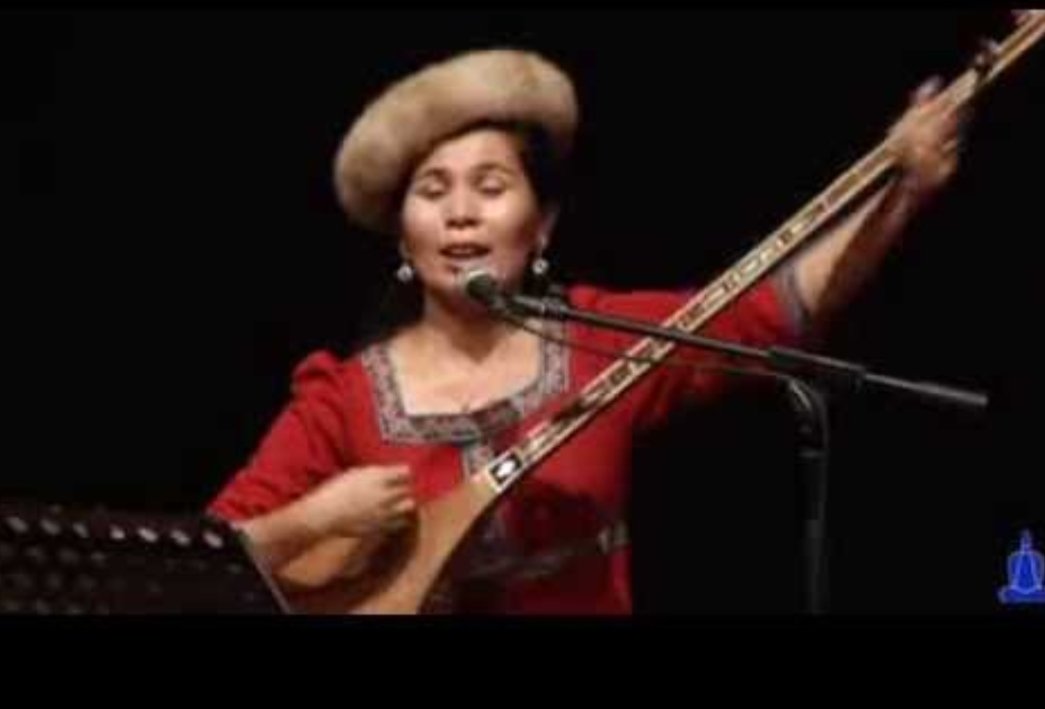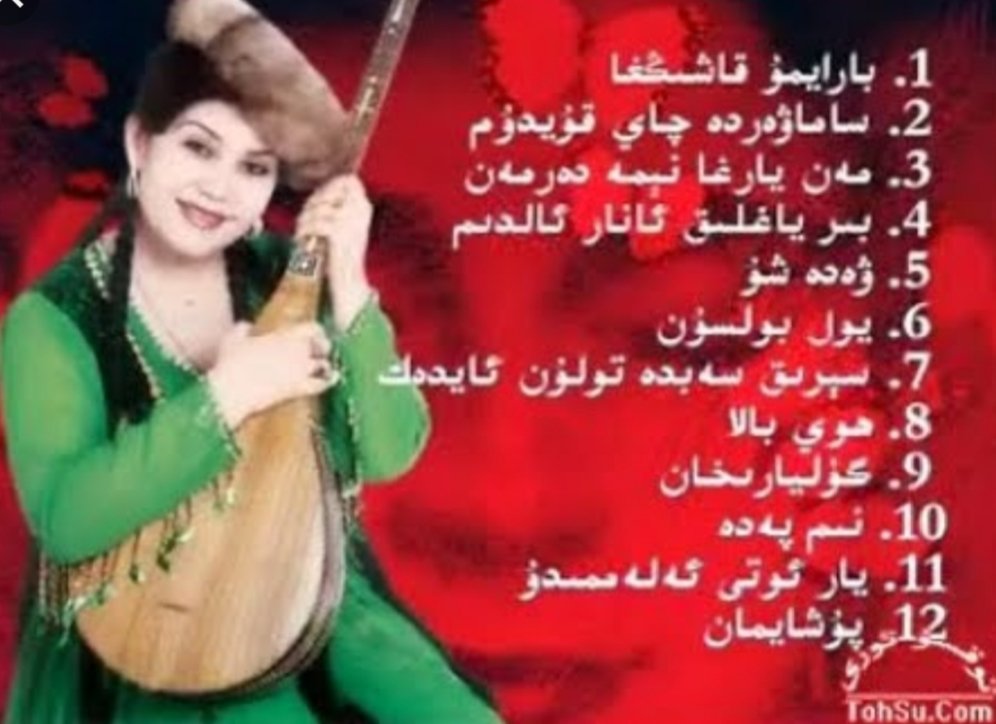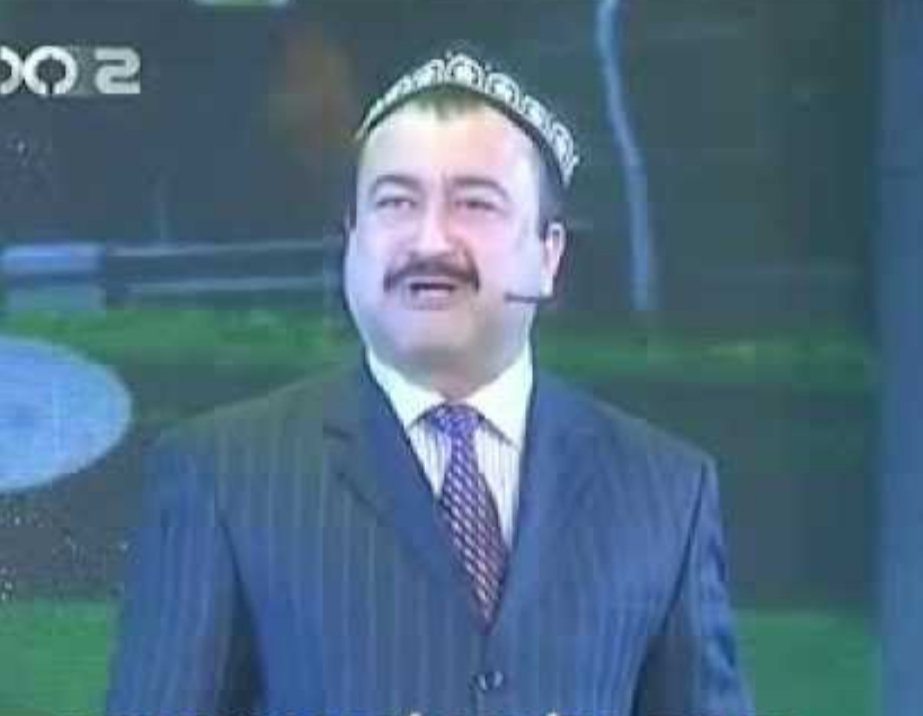据悉早先被抓的維吾尔著名女歌手Senever Tursun(左),Parida Mamut(中),Aytilla Ala最近被各判5年。早于被停止的"維吾尔小品王"Adil Mijit (右)几天前也被抓走。
https://m.facebook.com/story.php?story_fbid=2301141019921777&id=100000777053688&ref=content_filter …
#JusticeforUyghur #ConcentrationCamps #EastTurkistan #reeducationcamps



8:35 AM - 15 Dec 2018 https://twitter.com/Uyghurspeaker
- ............................................................................................................
1-17-19 As a longterm researcher of Uyghur culture, I will talk about the recent wave of disappearances of leading Uyghur artists in December 2018, among them her long-term collaborator and friend, singer Sanubar Tursun….
- The levels of terror within the region are such that no protest and no opposing voices can possibly be raised there. Secondly, it is apparent that there is a deliberate policy of targeting cultural leaders: writers, academics, artists, adding weight to the charge of cultural genocide that is now being raised by Uyghurs in exile....
- In December news began to circulate of Sanubar's detention and a possible 5-year sentence. As usual there has been no formal charge, not even an announcement of her detention.
From what we have learned of conditions within the camps, Sanubar is likely being held in an overcrowded and unsanitary cell along with up to 60 other women with space for sleeping only in shifts. Days are spent in a monotonous regime of singing Chinese revolutionary songs, studying Chinese language and the thought of Xi Jinping, and in self-criticism sessions in which they are required to denounce their own religion and culture.
Detainees are under constant surveillance, constrained to sit motionless, hands on desks, during 4-hour long study sessions. Failure to comply is punished by deprivation of food. There are harrowing reports of unknown forms of medication being forcibly administered, of violence and torture, of nervous breakdowns, suicides and deaths.
Not even the most violent extremist should be subject to the kind of treatment being meted out in these camps, but as Sanubar’s case makes absolutely clear, the mass detentions in Xinjiang are far away from the targeted response to Islamic extremism that the Chinese government claims it is pursuing.
Sanubar’s rapid fall from celebrity to internment camp came alongside a wave of reports of well-known artists being arrested. Those we have firm news of include the much-loved comedian Adil Mijit, veteran pop star Rashida Dawut, the young singer Zahirshah who came to fame through the Voice of the Silk Road TV program, and the veteran folk singer Peride Mamut whose cassettes of charming Kashgar folk songs brightened the post-Cultural Revolution scene in the 1980s.
https://theglobepost.com/2019/01/17/cultural-genocide-xinjiang/
.................................................................................…...............................…
9-21-18 Every morning Meripet wakes up to her nightmare: the Chinese government has turned four of her children into orphans, even though she and their father are alive.
Meripet and her husband left the kids with their grandmother at home in China when they went to nurse Meripet’s sick father in Turkey. But after Chinese authorities started locking up thousands of their fellow ethnic Uighurs for alleged subversive crimes such as travel abroad, that visit became exile. Then her mother-in-law was also taken prisoner, and Meripet learned from a friend that her offspring, aged between three and eight, had been placed in a de facto orphanage in the Xinjiang region under the care of the state that broke up her family….
Now there is evidence that the government is placing the children of detainees and exiles into dozens of orphanages across Xinjiang. The institutions are the latest example of how China is systematically distancing young Muslims in Xinjiang from their families and culture, interviews with more than a dozen people and a review of procurement documents suggest. The government has been building thousands of so-called “bilingual” schools, where minority children are taught in Mandarin and penalised for speaking in their native tongues. Some of these are boarding schools, which Uighurs say can be mandatory for children and, in one Kazakh family’s case, start from the age of five.
China says the orphanages help disadvantaged children, and it denies the existence of internment camps for their parents. It prides itself on investing millions of yuan in education in Xinjiang to steer people out of poverty and away from terrorism. At a regular news briefing on Thursday, Chinese foreign ministry spokesman Geng Shuang said the measures taken in Xinjiang were necessary for “stability, development [and] harmony” and to fight ethnic separatists.
But Uighurs fear that these measures are essentially wiping out their ethnic identity, one child at a time. Experts say what China is doing echoes how white colonialists in the US, Canada and Australia treated indigenous children – policies that have left generations traumatised….
For Meripet the loss is agony; it is the absence of her children and the knowledge they are in state custody. A year and a half after leaving home, the 29-year-old mother looked at a photo of a brightly painted building surrounded by barbed wire where her children are believed to be held. She fell silent. And then she wept. “When I finally see them again, will they even recognise me?” she asked. “Will I recognise them?”
When Mr. Xi came to power in 2012, an early challenge to his rule was a surge in violent attacks that killed several hundred people and which Beijing pinned on Uighur separatists. Since then he has overseen the most extensive effort in recent years to quell Xinjiang, appointing in 2016 the former Tibet party boss Chen Quanguo to lead the troubled region bordering Afghanistan.
Chen rolled out unprecedented security measures such as the internment camps that hold Muslims without trial and force them to renounce their faith and swear loyalty to the ruling Communist Party. China has described religious extremism as an illness that needs to be cured through what it calls “transformation through education”. Former detainees say one can be thrown into a camp for praying regularly, reading the Quran, going abroad or even speaking to someone overseas. …
In Xinjiang, detention has left countless children without their parents. Most of these families in China cannot be reached by journalists. However, reporters interviewed 14 Uighur families living in Turkey and one Kazakh man in Almaty with a total of 56 children who remain in China.
The families say that among these children, 14 are known to be in state-run orphanages and boarding schools. The whereabouts of the rest are unknown because most of their adult relatives in Xinjiang have been detained….
The regional government appears to be moving quickly to build centres to house the children of these exiles and of detainees. A review of procurement notices in Xinjiang has found that since the start of last year, the government has budgeted more than $30m (200 million Chinese yuan, £22.7m) to build or expand at least 45 orphanages, known variously as “welfare centres” and “protection centres”, with enough beds to house about 5,000 children. …
Hotan City Kindness Kindergarten in southern Xinjiang looks like a house-sized castle, with a bright marigold facade, orange turrets and blue rooftops. Its entrance is blocked by an iron gate and a walled enclosure lined with barbed wire. “We Are Happy and Grateful to the Motherland”, say the red characters emblazoned on one fence. The principal, who gave only her last name, Ai, told reporters that the institution was “just a normal kindergarten”. But the authorities’ anxiety was clear: armed police officers surrounded the reporters’ car minutes after their arrival at the school and ordered them to delete any photos. …
-Security inspect camera equipment of journalists outside the Hotan City Kindness Kindergarten (AP).
Aziz fled to Turkey more than a year ago after he received a call from his local police station ordering him to report to authorities immediately. More than half his neighbours had already been taken away to re-education centres or prison, he said. Now the young doctor is often shaken awake by a nightmare in which his kids are huddling at the bottom of a cliff, their faces smudged with dirt, calling to him to hoist them up. Aziz walks for what feels like hours but cannot reach them. He awakens with their cries ringing in his ears. “If I could, I would choose not to have been born as a Uighur, to not have been born in Xinjiang,” Aziz said. “We are the most unfortunate ethnic group in the world.”
The Chinese government says all 2.9 million students attending compulsory elementary and junior high school in Xinjiang will receive Mandarin instruction by this month, up from just 39 per cent in 2016.
Even preschoolers are steeped in the language. A former teacher at a “bilingual” kindergarten outside Kashgar said all lessons were given in Mandarin and the entirely Uighur student body was banned from speaking Uighur at school….
Like all schools in China this one immersed children in patriotic education. Kindergarten textbooks were filled with songs like “Without the Communist Party, There Would Be No New China”, the teacher said.
Some bilingual schools are boarding schools, which are not uncommon in China. Xinjiang has long provided voluntary boarding school programmes that are seen as coveted opportunities for the best minority students. But several Uighurs asserted that in many cases boarding school was now mandatory for minority children, even though Han Chinese children could choose to continue living at home…. Dilnur said her neighbours too were only allowed to visit their kids at boarding school on Wednesday nights, and even then they had to hand them sweets through a fence.
“The educational goals are secondary to the political goals,” said Timothy Grose, a professor at Indiana’s Rose-Hulman Institute of Technology who has done research on Xinjiang boarding schools. “They aim to dissolve loyalties to ethnic identity ... toward a national identity.”
A government notice posted in February in Kashgar states that children in the fourth grade and above with parents in detention must be sent to boarding school immediately – even if one parent is still at home. Students must be instilled with socialist values, the notice said, and be taught to “be grateful for education and love and repay the motherland”, and avoid the “75 types of behaviour that show religious extremism”….
Abdurehim Imin, a writer from Kashgar, said a friend told him his 14-year-old daughter had been sent to a bilingual school in 2015 after his wife was arrested, ostensibly for receiving a gift of olive oil he sent her. When reporters visited what appeared to be his daughter’s school, Peyzawat County No 4 High School, a local plainclothes officer who identified herself as Gu Li said it was a bilingual boarding school….Barbed wire around the campus extended for miles, with rows of tall apartment buildings marked as dormitories. …
Since coming to Istanbul by himself in 2014, 42-year-old Imin, the writer, has led a solitary existence in a dimly lit apartment with bare walls and stacks of writings. For the first year he avoided looking at photos of his children. “We are dying every day,” Imin said. “We cannot see our kids, we cannot see our parents. This is an eternal torture.”
In December, he was sent a photo of his daughter wearing a traditional Chinese “qipao”. He deleted the picture because he could not bear to look at it, he said, and could not sleep for nearly a month. Imin also has four other children in Xinjiang. Last summer, a friend who had visited his home in Kashgar told Imin that two of them had been killed in a traffic accident while his wife was in prison. He does not know where the other two are. Feeling helpless, he wrote verse after verse in mourning: “I will go... to tear down your dark, endless night ... I will go, to embrace again my hometown ... I will go, bearing my sorrow to your tomb.” https://www.independent.co.uk/news/world/asia/china-uighurs-human-rights-muslims-orphanages-xinjiang-province-reeducation-a8548341.html
...................................................
...................................................
The richest 1 percent of households own half of all the stocks in the United States, a Goldman Sachs executive claimed. Speaking with Yahoo, the investment bank's chief economist Daan Struyven said the number has risen sharply over the past 30 years. "The wealthiest 0.1 percent and 1 percent of households now own about 17 percent and 50 percent of total household equities respectively, up significantly from 13 percent and 39 percent in the late '80s," Struyven said. https://www.newsmax.com/finance/streettalk/stock-market-goldman-sachs-1-percent-wall-street/2019/01/17/id/898731/

No comments:
Post a Comment